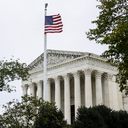SCOTUS could further erode voting rights. Here’s what to know

Published Date: 10/4/2022
Source: axios.com
The Supreme Court on Tuesday is hearing arguments in an Alabama redistricting case that could further erode the landmark Voting Rights Act, which prohibits discrimination in voting.
Why it matters: It puts on the chopping block a portion of the act that civil rights groups and minority voters have relied on for decades to challenge racially discriminatory redistricting maps.
- The ruling could also carry implications for how other states draw their own congressional maps.
What the Supreme Court is considering in Merrill v. Milligan
- The Supreme Court is weighing Alabama's 2021 congressional redistricting map, drawn by the state's GOP-legislature after the 2020 census.
- The congressional map gave Black voters — about 27% of the state — the majority in just one of the state's seven congressional districts, AP notes.
- The lawsuit filed on behalf of voters argued that the maps violate Section 2 of the Voting Rights Act, which requires that states provide minority voters with "an equal opportunity to participate in the political process," by diluting Black voter strength.
- The state has defended the Republican-drawn map, saying that it is taking a "race neutral" approach to redistricting and it is asking the court to overturn a lower court decision, per AP.
How the Alabama case got to the Supreme Court — and what they're saying
- A three-judge lower court, including two appointees of former President Trump, in January said Alabama's congressional map violated Section 2 of the Voting Rights Act.
- "The appropriate remedy is a congressional redistricting plan that includes either an additional majority-Black congressional district, or an additional district in which Black voters otherwise have an opportunity to elect a representative of their choice," the judges said in a 225-page ruling.
- The state of Alabama asked the Supreme Court to put the lower court hearing on hold while it appealed, which the justices allowed, AP reports.
- The Supreme Court in a 5-4 vote sided with the state, putting on hold the lower court ruling, and allowing the congressional map to stand for the 2022 elections.
- Supreme Court Justice Elena Kagan, with Justices Stephen Breyer and Sonia Sotomayor, dissented from the ruling, writing that “[it] forces Black Alabamians to suffer what under” the Voting Rights Act "is clear vote dilution."
Implications of the court's decision on the Voting Rights Act
- Civil rights groups and minority voters have relied on Section 2 of the Voting Rights Act to dispute racially discriminatory maps, per the liberal-leaning Brennan Center for Justice.
- Parts of the 1965 Voting Rights Act has been weakened by the Supreme Court at least two times over the last decade.
In 2013, the court eliminated a provision of the act that required oversight of any changes to election laws in some states with a history of discrimination in voting, per AP.
- And last year, the court upheld voting laws that critics said made it more difficult to bring cases under Section 2, per AP.
- The most immediate impacts of the Supreme Court's decision in Merrill v. Milligan could be in Georgia and Louisiana, where courts have already found that Section 2 requires redrawing of congressional maps, per the Brennan Center.
Go deeper... Mapped: Voting rights for 2022